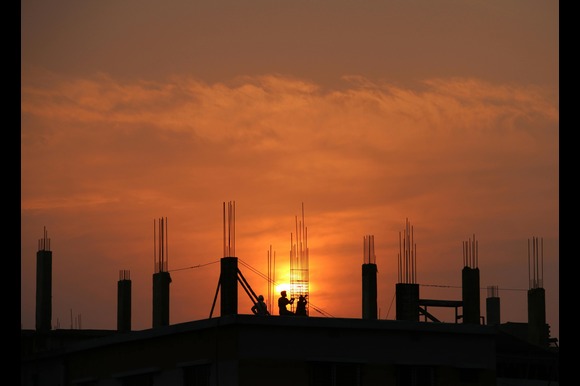Human rights organizations are raising the alarm over what they describe as a looming “surge” in the deaths of migrant construction workers in Saudi Arabia, as the Kingdom intensifies preparations to host the FIFA World Cup in 2034.
According to newly released reports by Human Rights Watch and FairSquare, laborers are already dying from workplace incidents that are entirely preventable. The reports claim that many of these fatalities are misclassified as resulting from natural causes, a move that often denies bereaved families the compensation they are entitled to receive.
Both advocacy groups are urging the Saudi government to implement and enforce basic safety measures to protect the country’s vast migrant labor force.
“The 2034 Saudi World Cup is poised to be the largest and most expensive tournament in history, but it may also come at an unprecedented human cost,” said Minky Worden, Director of Global Initiatives at Human Rights Watch. “Millions of migrant workers are now engaged in building essential infrastructure, including 11 new stadiums, a nationwide transit and rail network, and an estimated 185,000 hotel rooms.”
These warnings were issued just one day after FIFA President Gianni Infantino visited Saudi Arabia alongside former US President Donald Trump to attend a joint US-Saudi investment forum.
FIFA, the international governing body for football, has stated that it remains firmly committed to the protection and advancement of human rights throughout its operations. However, Human Rights Watch has criticized FIFA for failing to apply lessons learned from the migrant worker deaths that occurred during preparations for the 2022 World Cup in Qatar.
Reliable data on the deaths of migrant workers in Saudi Arabia is difficult to obtain, as access for human rights organizations is extremely limited and trade unions are banned. Nevertheless, Human Rights Watch managed to speak with the families of 31 deceased workers from countries including Bangladesh, India, and Nepal. These individuals reportedly died after falling from high places, being crushed or decapitated by heavy machinery, or being electrocuted.
Heat exposure is also a growing concern. Saudi Arabia is accelerating construction projects in its race to be ready for the 2034 tournament. In March, the death of a Pakistani foreman named Muhammad Arshad was reported after he fell at a stadium construction site in Al Khobar — the first confirmed World Cup-related fatality.
Last year, Saudi authorities asserted that significant progress had been made in the area of occupational safety and health. They claimed that injury and death rates were on the decline. FIFA echoed this sentiment, noting “substantial steps” Saudi Arabia has taken to reform its labor laws since 2018.
However, the global Building and Wood Workers’ International (BWI) union expressed concern over what it described as a “disturbing increase” in preventable workplace accidents. BWI’s General Secretary, Ambet Yuson, attributed these incidents to “systematic negligence, corruption, and inadequate oversight and accountability.”
FairSquare added that autopsies to determine precise causes of death are rarely conducted by Saudi medical authorities.
“Hundreds of thousands of young men — many with young families — are being thrust into a labor system that endangers their lives,” said James Lynch, Co-Director of FairSquare. “They face a healthcare system unequipped to determine how they died, and a political system that neither protects them nor investigates their deaths. Families are left without answers or justice, shattered by Saudi Arabia’s failure to act.”
Lynch also criticized FIFA’s human rights policies, calling them a “sham.”
“While FIFA showers Saudi Arabia with praise and elite Western law firms rake in profits helping polish the Kingdom’s image, children in places like Nepal are growing up fatherless, without ever learning how their loved ones died,” he added.
In response to Human Rights Watch, FIFA stated it is planning to implement a comprehensive workers’ welfare system designed to enforce mandatory standards and monitoring mechanisms specific to construction and service sectors tied to the World Cup.
A letter from FIFA noted: “We are confident that the mechanisms we are developing to ensure construction companies uphold workers’ rights on FIFA World Cup sites can establish a new benchmark for worker protection in the country. These measures can also support broader labor reforms and improve protections for workers beyond World Cup-related projects.”
However, Human Rights Watch pointed out that FIFA has not disclosed any details on how this proposed welfare system will function in practice.
The organization called on Saudi authorities, FIFA, and employers to guarantee that all migrant worker deaths — regardless of when, where, or how they occur — are thoroughly investigated. Furthermore, they urged that the families of deceased workers be treated with dignity and granted prompt and fair compensation.






